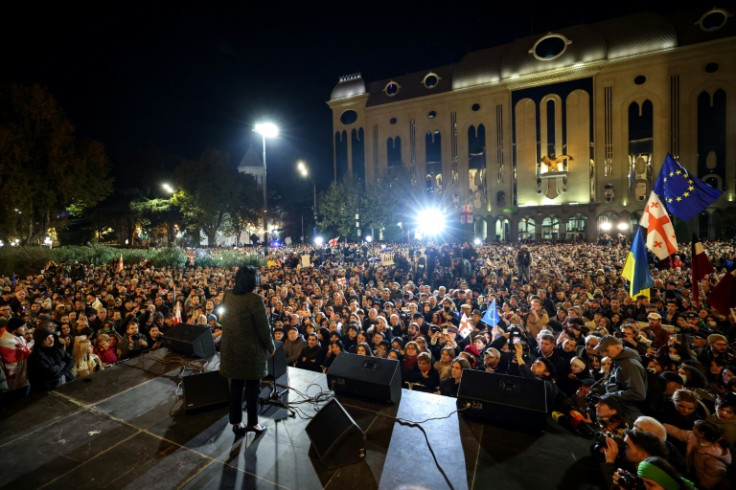Georgia President Hints At Russian-aided Vote Fraud In AFP Interview

Georgia's pro-European president Salome Zurabishvili in an interview with AFP Monday alleged that parliamentary polls -- whose results have been rejected by the opposition -- were marred by widespread voting fraud bearing the hallmarks of Russia's influence.
According to near-final results announced by the electoral commission, the ruling party Georgian Dream won 53.92 percent of the vote in Saturday's election, compared with 37.78 percent won by a union of pro-Western opposition alliances.
The opposition has said the vote was unfair and has refused to concede defeat to a party it accuses of pro-Kremlin authoritarianism.
Moscow has rejected opposition claims of interference in the vote.
But Zurabishvili -- who has a figurehead role in Georgian politics -- has declared the announced results "illegitimate" and pointed at the Caucasus country's former Soviet master.
Speaking to AFP, the head of state claimed that "quite sophisticated" fraudulent schemes were used in the weekend vote -- with a higher level of planning than the government seemed capable of achieving to stay in power.
This appeared to show "Russian methodology", which she said was unsurprising "given what the relations are between the party in power and Russia".
She alleged that Georgian Dream's "electoral propaganda was totally copied from Russian propaganda" and "they have PR people... who come from Russia".
"It's very difficult to accuse a government, and that's not my role, but the methodology is Russian," she said.
In addition, the vote saw "methods linked to" electronic voting technology, used for the first time in Georgia, she alleged.
Identity cards with the same number were used to register "up to 17, 20 votes in different regions", she added.
More "classic methods" of electoral fraud were also employed, the president charged, including "the purchase of votes, pressure in particular on public office holders, pressure on the families of prisoners who can be promised release".
"There was money distributed visibly in minibuses at the exit of the polling stations," she claimed.
Zurabishvili likewise pointed to seemingly incredible vote tallies for the ruling party in areas with significant ethnic minority populations, such as the Azerbaijani-majority city of Marneuli.
"In some ethnic minority towns and villages, the results were 97 percent" in favour of Georgian Dream, she said.
"I don't think we've seen anything like that since the Stalinist period."
Thousands took to the streets of the capital Tbilisi on Monday evening in response to opposition calls to protest the "stolen election" -- a call Zurabishvili urged Georgians to heed.
"People know full well that we should not threaten the country's stability. But that does not mean that we should be complacent and resigned to this theft," the president said.
"This is a theft not only of our voice... it's the theft of our future in Europe," she added.
Under the Georgian constitution, the country officially aspires to join the EU and the US-led NATO defence alliance.
But in the aftermath of the passing of a Kremlin-copycat "foreign influence" law used to silence dissent, Brussels placed Georgia's EU accession process on ice while the United States imposed sanctions on several Georgian officials.
Three weeks ahead of the election, the Georgian Dream party also passed legislation severely restricting the rights of LGBTQ people, with hostility to alternative sexualities still strong in the deeply Orthodox Christian country.
Zurabishvili said Georgia could only return to the path to EU membership "if there is a change of policy".
She urged a "clear will on the part of the authorities to recognise a part of the fraud, to accept and immediately promise or implement the cancellation of the laws on foreign agents, on LGBTQ people".
"There are several laws that are turning this country into a Russian-style regime."
A former member of the USSR nestled on the shores of the Black Sea, Georgia still bears the scars of a brief war with Russia in 2008.
The ruling party advocates improved relations with Moscow, raising the spectre of the "Ukrainisation" of Georgia and fresh fighting with the Kremlin's troops.
For Zurabishvili, the government is making a grave mistake -- not least given Russia's role as Ukraine's "aggressor".
"As long as Russia does not return to the path of international norms and standards, it is difficult to deal with. It is threatening," the president warned.
"And I think the population here is perfectly aware of that."

© Copyright AFP 2024. All rights reserved.











